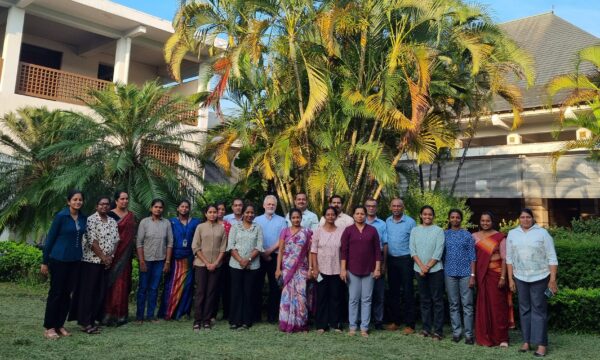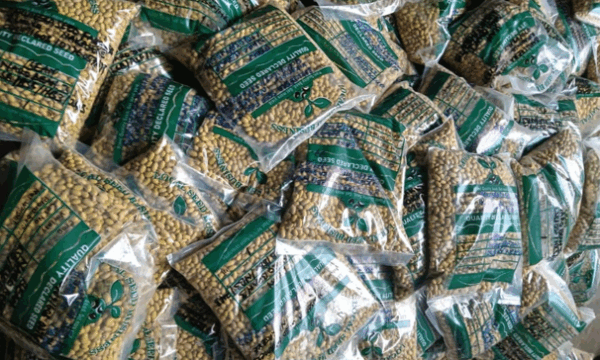
CABI has delivered a four-day training and write-shop on the production of extension materials to support PlantwisePlus plant doctors working to help improve the livelihoods of smallholder farmers in Namibia as well as local and national food security efforts.
The work was carried out as part of an initiative between CABI and the Food and Agriculture Organization of the United Nations (FAO) in conjunction with the Ministry of Agriculture, Water and Land Reform (MAWLR).
Dr Noah Phiri, Regional Representative, Southern Africa and Dr Negussie E Gurmessa, Scientist and Country Programmes Manager, based at CABI’s Sub-regional centre in Lusaka, Zambia, and in Ethiopia, respectively, delivered the training to 19 experts, and facilitated production of Pest Management Decision Guides (PMDGs) and Factsheets.
These included those drawn from different divisions of the MAWLR as well as researchers, a university lecturer, FAO Namibia, representatives of farmer associations and those from the private sector.
Important tools used by plant doctors
The aim of the workshop, which also included a write shop, was to help the plant doctors – working at 10 plant clinics in Namibia – produce and use extension materials such as Pest Management Decision Guides (PMDGs) and Factsheets.
These materials are important tools used by plant doctors in supporting farmers to implement Integrated Pest Management (IPM) practices against a range of crop pests of national economic significance.

The first day of the training focussed on an introduction to PMDGs, IPM and CABI pesticide policies, international agreements on hazardous pesticides and various templates. The second and third days were dedicated to drafting and reviewing PMDGs.
During the last day, Dr Phiri and Dr Gurmessa focused on production of Factsheets on topics which emerged during PMDG development. In the end, 12 PMDGs and 4 Factsheets were drafted and reviewed (in plenary and by trainers).
In addition, the CABI team and FAO representative also took the opportunity to discuss project related issues such as the extension of the current project, plans for upcoming activities, and considerations for the next phase of the project.
Strengthen plant health advisory services
Dr Phiri said, “The training workshop and write-shop was an important part of the overall initiative to support the introduction of community-based plant clinics in selected regions of Namibia to strengthen plant health advisory services in tackling crop pests and diseases, and, thereby, increase farmers productivity and income.
“It is essential that the plant doctors are equipped with the latest and best knowledge available on sustainable IPM practices to share with smallholder farmers so that their plant health issues can be diagnosed and mitigated.
“Of course, key to this is also the use of digital resources, such as those from the PlantwisePlus Toolkit including the PlantwisePlus Factsheet Library.”
One example of the resources within the PlantwisePlus Toolkit is the CABI BioProtection Portal which helps farmers find and correctly use locally registered biocontrol and biopesticide products to treat crop pests.

Dr Negussie E Gurmessa said the participants were able to develop 12 PMDGs and 4 Factsheets which exceeds the target for the year of 6 PMDGs and Factsheets. The next stage of the work is to review, finalize and published the developed materials.
Drafted PMDGs also include those for late blight on Irish potato, striga on cow peas and aphids on cabbage while drafted factsheets also included those for the use of hot pepper wax spray on tomato and a fluorescent light trap for tomato leaf miner.
Increasing crop yields through reducing loses
Dr Gurmessa said, “The FAO in collaboration with MAWLR and in partnership with CABI has implemented a project that aims to improve the livelihoods and food security of the rural poor by increasing crop yields through reducing loses against pest and plant diseases.
“This will be achieved through the establishment of networks of community-based plant clinics that will deliver practice advice to farmers to manage crops affected by such issues.
“The training and write-shop are part of the planned activities to support the enhancement of the capacity of local extension staff that included the setting up of the plant clinics as well as biological control training, e-plant clinic training, and launching and demonstrating the launch of a plant clinic.”
Following the workshop and write-shop it was confirmed that the FAO agreed to allow ‘no cost’ extension of the initiative up to January 2025, and the LoA is currently being revised.
When it was announced that 10 plant clinics would be established in Namibia at the beginning of August, Ferdinand Mwapopi, the FAO Assistant Country Representative, said there is a need to collaborate with CABI on a wide range of issues beyond the remit of the plant clinics.
Country’s commitment to protecting its agricultural resources
He noted that the launch of plant clinics symbolizes the country’s commitment to protecting its agricultural resources from the devastating impact of plant pests and diseases. Mr Mwapopi said the FAO is proud to be part of this important initiative along with CABI, particularly its global PlantwisePlus programme.
Ms Paulina Shilunga, representative of MAWLR, in her closing remarks highlighted that this is a great opportunity that helped build the capacity of the national experts on production of relevant extension materials.
She noted that these materials are crucial tools that would help extension staff to implement IPM practices. She congratulated and thanked the CABI team (trainers), FAO and participants for organising and running such a productive workshop.
Additional information
Main image: Participants of the workshop and write shop held at the Country Club Hotel in Windhoek, Namibia (Credit: CABI).
Relevant story
‘CABI and FAO collaborate to launch plant clinics in Namibia.’
Related News & Blogs
CABI Academy supports Vietnamese universities in training the next generation of plant health professionals
Plant health lies at the centre of food security and sustainable agriculture. In Vietnam, as in many countries, preparing the next generation of plant specialists with the latest knowledge and practical skills is essential to achieving this goal. Under…
7 July 2025




